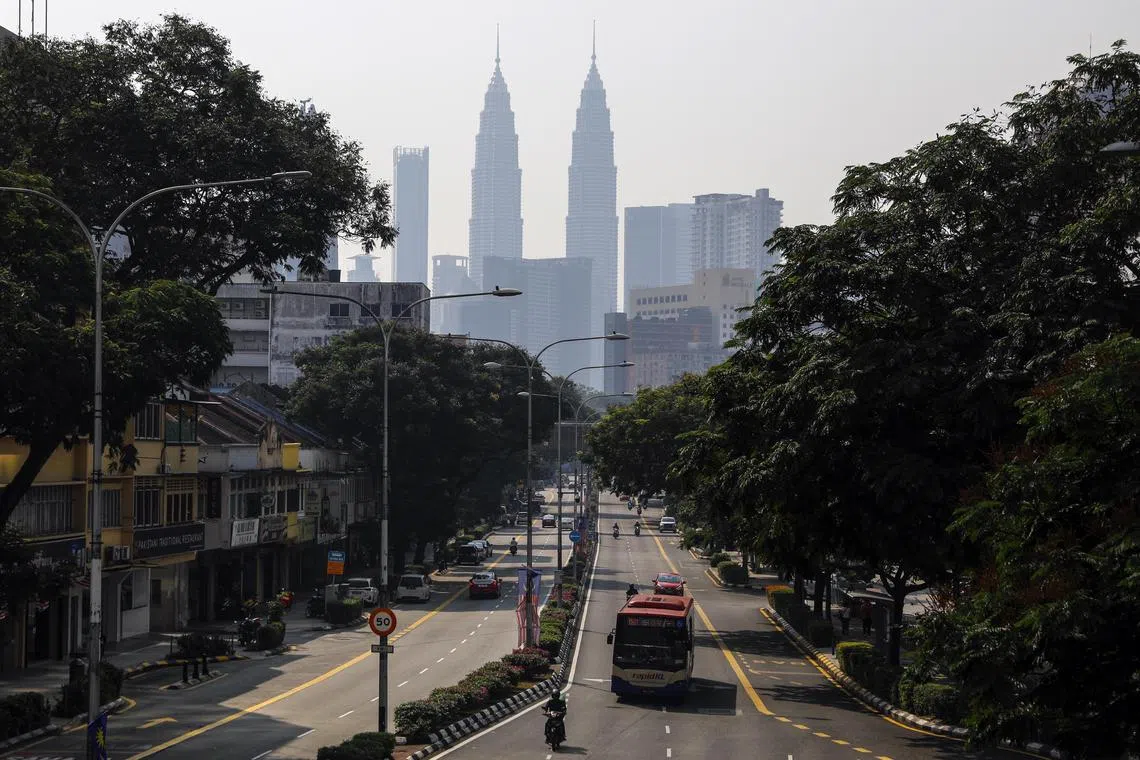Malaysian parents take precautions to limit children’s exposure to haze
Sign up now: Get insights on the biggest stories in Malaysia

Experts warned against taking the haze lightly as 94 per cent of it consists of harmful air particles as small as 2.5 micrometres.
PHOTO: EPA-EFE
Follow topic:
PETALING JAYA – Limiting outdoor activities and masking up are among the measures being taken by parents in Malaysia to limit their children’s exposure to the haze.
Ms Myra Latifa Abdul Rahman said she needed to be cautious because her 10-year-old son is allergic to dust. “I try to limit my son’s outdoor activities as best I can. Whenever he goes to school or tuition, I make sure he wears an N95 mask that protects him from harmful air particles,” said the 35-year-old marketing executive.
She has a lot of plants in her house that act as natural air purifiers to keep the air clean. “I also make sure that my son stays hydrated by drinking lots of water,” she said.
Ms Melina Idris, who has a one-year-old child, said she decided to stay home on Saturday after noticing that it was slightly hazy that morning. The 33-year-old wanted to keep her daughter indoors, where there are air-conditioners that filter the air.
Dr Adam Mikael Muzhafar, a father of twins, wants the government to issue early warnings about the haze so that parents can prepare for it.
“I hope steps can also be taken to prevent neighbouring countries from spreading polluted air as it poses a health threat to all of us,” said the 34-year-old doctor, adding that an indoor air purifier is useful as it can filter out harmful particles. “It helps whenever the haze comes around.”
Despite the worries, pharmacies said there has been no rush to buy face masks. Pharmacy owner Michael Kok, 47, said sales of face masks had not picked up despite the poor air quality. “There was a downpour the night before, so the air seems better now,” he said at his shop in Ipoh, Perak.
Mr Kok said there would be enough face masks even if there were a sudden spike in demand.
At another pharmacy, an employee who wished to be known only as Ms Lau said there were face masks aplenty. “Since Covid-19 cases are seemingly not so prevalent now, people rarely buy face masks. We have plenty of stock, so there are no worries they will run out soon,” she said.
Pharmacist Lee Huan Yee said face mask sales at her store in Petaling Jaya dropped by 35 per cent in September.
She said adults should use N95 masks while children should wear surgical masks if there is haze. “It is better to limit children’s outdoor activities because surgical masks aren’t very effective against the haze,” she added.
According to the Health Ministry, people are encouraged to wear a respirator rather than a surgical mask during the haze. “Respirators (such as N95 masks) work better than surgical masks as they seal better and restrict more polluted air from entering the nose and mouth,” it said on its website.
However, the ministry noted that N95 masks are not suitable for pregnant women, children or people with chronic lung or heart conditions.
Public health expert Zainal Ariffin Omar said vulnerable groups such as children and the elderly should stay indoors during the haze. Motorcyclists and outdoor workers should wear face masks, he added.
Dr Zainal also said the public should avoid open burning, besides staying updated with government announcements on the situation.
“Drink lots of water. See a doctor if you experience breathing difficulties,” he advised.
Universiti Kebangsaan Malaysia’s public health expert, Professor Sharifa Ezat Wan Puteh, warned against taking the haze lightly, as 94 per cent of it consists of harmful air particles as small as 2.5 micrometres that can easily enter the lungs and bloodstream.
“I would advise people to close their doors and windows and clean the house to get rid of dust,” she said.
She also recommended having indoor plants to help filter the air. THE STAR/ASIA NEWS NETWORK

